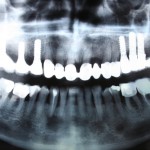
Despite increasing interest in patient reported outcomes research on dental implants has tended to focus on clinical and radiographic parameters.
The aim of this study was to evaluate patient-reported outcomes following implant-supported restorative treatment.
Methods
4716 patients were randomly selected from the data register of the Swedish Social Insurance Agency. 3000 were aged between 65 and 74 years; 1716 aged 45–54 years. Information about gender, type of implant- supported dental prostheses and clinicians involved in the treatment was extracted from the data register of the SSIA and entered into a database. Patients were categorised according to implant restoration type i) single-crown, (ii) partial-jaw restoration or (iii) full-jaw restoration. Patients were allocated to most extensive category in case of multiple restorations. Patients received a questionnaire about 6 years following completion of restoration with a reminder at 4 weeks.
Results
- 3827 (83%) patients responded.
- Response was higher in the older age group, 83% compared with 77% for the younger age group.
- 64% received care in private clinical setting
- 74% of surgical care was carried out by specialists
- 76% of restorative treatment was carried out by general practitioners.
- 94 % were satisfied with the overall and aesthetic result.
- 31% of patients had experienced an implant-related complication.
- 83% considered that the treatment was worth the cost and would consider implant treatment again.
- 79% of patients reported having regular follow ups
- Older patients presented with an overall more positive perception of the results of the therapy than younger patients and males were more frequently satisfied in terms of esthetics than females.
- While clinical setting did not influence results, patients treated by specialist dentists as opposed to general practitioners reported a higher frequency of esthetic satisfaction and improved chewing ability.
- Patients who had received extensive implant-supported reconstructions, in contrast to those with small reconstructive units, reported more frequently on improved chewing ability and self-confidence but also to a larger extent on implant-related complications.
Conclusions
The authors concluded
It is suggested that patient-perceived outcomes of implant-supported restorative therapy are related to (i) age and gender of the patient, (ii) the extent of restorative therapy and (iii) the clinician performing the treatment.
Commentary
This cross sectional survey of a random sample of Swedish adults who had previously undergone dental implant treatment has achieved a high response rate. The authors do note however that the questionnaire was locally developed and had not been assess in terms of validity and reliability. That said the survey does find a very high level of satisfaction with the implant treatment received despite that fact that almost one in three patients have reported that had suffered some complications. The degree of complication is not reported but only 6% reported that the complications were frequent which may indicate more serious problems. The other point that the authors highlight in the discussion which should be borne in mind when considering the finding of this study is that it represents the patients view at a single point in time.
Links
Derks J, Håkansson J, Wennström JL, Klinge B, Berglundh T. Patient-reported outcomes of dental implant therapy in a large randomly selected sample. Clin Oral Implants Res. 2014 Aug 14. doi: 10.1111/clr.12464. [Epub ahead of print] PubMed PMID: 25123298.

Don’t miss – Dental implants: survey found high levels of patient satisfaction http://t.co/UUDa0ypL2K
“@TheDentalElf: Dental implants: survey found high levels of patient satisfaction http://t.co/gJfaDafZPn” #Dentistry #DentalImplants